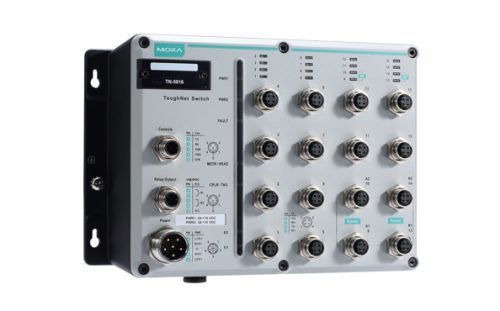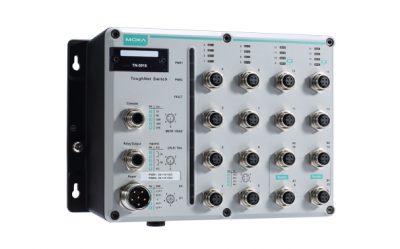- Description Specs Details Overview Components Packages Resources Additional Modules Complementary products Architecture Tools Benefits Features Customer Ordering
- Thông số Specs Details Overview Components Packages Resources Additional Modules Complementary products Architecture Tools Benefits Features Customer Ordering
- Ordering Specs Details Overview Components Packages Resources Additional Modules Complementary products Architecture Tools Benefits Features Customer Ordering
- Tài liệu Specs Details Overview Components Packages Resources Additional Modules Complementary products Architecture Tools Benefits Features Customer Ordering
Features and Benefits
- Designed for rolling stock backbone networks
- Dual bypass relay
- Isolated power input range from 24 to 110 VDC
- Complies with all EN 50155 mandatory test items*
- -40 to 75°C operating temperature range
- Turbo Ring and RSTP/STP for network redundancy
*This product is suitable for rolling stock railway applications, as defined by the EN 50155 standard. For a more detailed statement, click here:
Introduction
The ToughNet TN-5916, designed for rolling stock backbone networks, is a high performance M12 router with four bypass relay backbone ports. It supports NAT and routing functionality to facilitate the deployment of applications across networks. The TN-5916 router uses M12 and other circular connectors to ensure tight, robust connections that guarantee reliability against environmental disturbances, such as vibration and shock. The TN-5916 router provides a wide power input range of 24 to 110 VDC. The TN-5916 operates in an extended operating temperature range of -40 to 75°C and is compliant with EN 50155/50121-4 requirements, making the router suitable for a variety of industrial applications.
| • Technology | |
| Standards | IEEE 802.3 for 10BaseT IEEE 802.3u for 100BaseT(X) IEEE 802.3x for Flow Control IEEE 802.1D-2004 for Spanning Tree Protocol IEEE 802.1w for Rapid STP IEEE 802.1Q for VLAN Tagging IEEE 802.1p for Class of Service IEEE 802.3ad for Static Port Trunking |
| • Software Features | |
| Management | SNMP v1/v2c/v3, Account Management, Telnet, Console – CLI, DHCP Server, LLDP, Port Mirror, Syslog, TFTP, SMTP Client, RARP, HTTP, HTTPS, SNMP inform, Flow Control, Back pressure flow control |
| Filter | 802.1Q VLAN, IGMPv1/v2, Static Multicast |
| Redundancy Protocols | STP/RSTP, Turbo Ring v2, Static Port Trunk |
| Security | Management Interface Control (TCP/UDP port blocking), Trusted Access Control |
| Time Management | SNTP, NTP Server/Client |
| Routing Redundancy | VRRP |
| NAT | N-1 NAT, 1-1 NAT, Port Forwarding |
| • Router Properties | |
| Priority Queues | 4 |
| Max. Number of VLANs | 16 |
| VLAN ID Range | VID 1 to 4094 |
| IGMP Groups | 256 |
| • Interface | |
| Fast Ethernet | Front cabling, M12 D-coded 4-pin female connector, 10/100BaseT(X) auto negotiation speed, F/H duplex mode, and auto MDI/MDI-X connection, with 4 bypass relays on backbone ports |
| Console Port | M12 A-coded 5-pin male connector |
| Alarm Contact | 2 relay outputs in one M12 A-coded 5-pin male connector with current carrying capacity of 1 A @ 30 VDC |
| • Power Requirements | |
| Input Voltage | 24/36/48/72/96/110 VDC |
| Operating Voltage | 16.8 to 137.5 VDC |
| Input Current | 0.85 A @ 24 VDC; 0.17 A @110 VDC |
| Overload Current Protection | Present |
| Connection | M23 connector |
| Reverse Polarity Protection | Present |
| • Physical Characteristics | |
| Housing | Aluminium alloy |
| IP Rating | IP54 protection (optional protective caps available for unused ports) |
| Dimensions | 250 x 175.8 x 116.3 mm (9.84 x 6.92 x 4.58 in) |
| Weight | 4030 g (8.88 lb) |
| Installation | Panel mounting, DIN-rail mounting (with optional kit) |
| • Environmental Limits | |
| Operating Temperature | Wide Temp. Models: -40 to 75°C (-40 to 167°F) |
| Storage Temperature | -40 to 85°C (-40 to 185°F) |
| Ambient Relative Humidity | 5 to 95% (non-condensing) |
| Altitude | 2,000 m |
| • Standards and Certifications | |
| Safety | UL/cUL 508, EN 60950-1 (LVD) |
| EMC | EN 55032, EN 55024 |
| EMI | CISPR 32, FCC Part 15B Class A |
| EMS | IEC 61000-4-2 ESD: Contact: 6 kV; Air: 8 kV IEC 61000-4-3 RS: 80 MHz to 1 GHz: 20 V/m IEC 61000-4-4 EFT: Power: 2 kV; Signal: 2 kV IEC 61000-4-5 Surge: Power: 2 kV; Signal: 2 kV IEC 61000-4-6 CS: 10 V IEC 61000-4-8 |
| Rail Traffic | EN 50155*, EN 50121-4, EN 45545-2 *This product is suitable for rolling stock railway applications, as defined by the EN 50155 standard |
| Shock | EN 50155, EN/IEC 61373 |
| Freefall | IEC 60068-2-32 |
| Vibration | EN 50155, EN/IEC 61373 Note: Please check Moxa’s website for the most up-to-date certification status. |
| • MTBF (mean time between failures) | |
| Time | 556,025 hrs |
| Standard | Telcordia SR332 |
Available Models
| Model No. | Description | |
|---|---|---|
| TN-5916-WV-T | NAT router with 16 10/100BaseT(X) ports, and 4 of 10/100BaseT(X) ports with bypass relay function, dual redundant power inputs (24 – 110 VDC), -40 to 75°C operating temperature | |
| TN-5916-WV-CT-T | NAT router with 16 10/100BaseT(X) M12 ports and 4 of 10/100BaseT(X) ports with bypass relay function, dual power inputs ( 24 to 110 VDC), -40 to 75°C operating temperature, conformal coating model |
White Paper: Optimized Ethernet Redundancy for Inter-Consist NetworksNetwork redundancy is a critical factor in ensuring passenger safety and journey reliability in onboard railway communications for both intra-consist and inter-consist Ethernet networks. In addition, railway operators are looking for aways to more efficiently allocate resources and serve passenger demands. For example, metropolitan rail services may want to run trains with fewer consists during off-peak hours but longer trains with more consists during rush hour. Railway operators can also serve multiple markets and conserve track assets by connecting multiple consists with different destinations into one train if they will travel along the same route for at least part of the journey. This white paper describes how Dynamic Ring Coupling helps railway operators provide seamless onboard Ethernet redundancy with both rapid recovery times and automatic Ethernet switch configuration even when consists are rearranged mid-journey. |  |
2015 Railway Application GuideMoxa has provided key communications, data control, and computing infrastructure for dozens of successful major railway projects around the world. Metro, mainline, high speed rail, and conventional rolling stock applications on six continents. This brochure examines some key application scenarios and how Moxa addresses today’s industrial challenges. This brochure covers the following applications:
| .jpg) |



